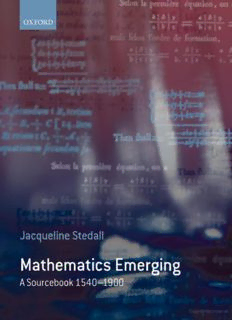Table Of ContentMATHEMATICS EMERGING
A SOURCEBOOK 1540–1900
This page intentionally left blank
M AT H E M AT I C S
E M E RG I N G
A SOURCEBOOK 1540–1900
Jacqueline Stedall
1
3
GreatClarendonStreet,Oxfordox26dp
OxfordUniversityPressisadepartmentoftheUniversityofOxford.
ItfurtherstheUniversity’sobjectiveofexcellenceinresearch,scholarship,
andeducationbypublishingworldwidein
Oxford NewYork
Auckland CapeTown DaresSalaam HongKong Karachi
KualaLumpur Madrid Melbourne MexicoCity Nairobi
NewDelhi Shanghai Taipei Toronto
Withofficesin
Argentina Austria Brazil Chile CzechRepublic France Greece
Guatemala Hungary Italy Japan Poland Portugal Singapore
SouthKorea Switzerland Thailand Turkey Ukraine Vietnam
OxfordisaregisteredtrademarkofOxfordUniversityPress
intheUKandincertainothercountries
PublishedintheUnitedStates
byOxfordUniversityPressInc.,NewYork
©OxfordUniversityPress2008
Themoralrightsoftheauthorshavebeenasserted
DatabaserightOxfordUniversityPress(maker)
Firstpublished2008
Allrightsreserved.Nopartofthispublicationmaybereproduced,
storedinaretrievalsystem,ortransmitted,inanyformorbyanymeans,
withoutthepriorpermissioninwritingofOxfordUniversityPress,
orasexpresslypermittedbylaw,orundertermsagreedwiththeappropriate
reprographicsrightsorganization.Enquiriesconcerningreproduction
outsidethescopeoftheaboveshouldbesenttotheRightsDepartment,
OxfordUniversityPress,attheaddressabove
Youmustnotcirculatethisbookinanyotherbindingorcover
andyoumustimposethesameconditiononanyacquirer
BritishLibraryCataloguinginPublicationData
Dataavailable
LibraryofCongressCataloginginPublicationData
Dataavailable
TypesetbyNewgenImagingSystems(P)Ltd.,Chennai,India
PrintedinGreatBritain
onacid-freepaperby
CPIAntonyRowe,Chippenham,Wiltshire
ISBN 978–019–922690–0
10 9 8 7 6 5 4 3 2 1
ForTom,wholovesmathematics,
and
forEllie,wholovesoldbooks.
This page intentionally left blank
CONTENTS
Acknowledgements xiii
Introduction xv
1 BEGINNINGS 1
1.1 Beginningsofarithmetic 2
1.1.1 Largenumbercalculations,c.1800bc 2
1.1.2 Sacrobosco’sAlgorismus,c.1230ad 4
1.2 Beginningsofgeometry 8
1.2.1 Euclid’sdefinitions,c.250bc 9
1.2.2 Euclid’sconstructionofproportionals, c.250bc 12
1.2.3 Archimedesoncirclemeasurement, c.250bc 14
1.2.4 Apollonius’Conics,c.185bc 16
1.3 Beginningsofatheoryofnumbers 19
1.3.1 Euclid’sdefinitionsofnumber,c.250bc 19
1.3.2 Euclid’sproofoftheinfinityofprimes,c.250bc 23
1.3.3 TheArithmeticaofDiophantus,(after150ad) 24
1.4 Beginningsofalgebra 26
1.4.1 Completingthesquare,c.1800bc 26
1.4.2 Al-Khwa¯rizm¯ı’sAl-jabr,c.825ad 29
2 FRESHIDEAS 33
2.1 Improvementsincalculation 34
2.1.1 Stevin’sdecimalfractions,1585 34
2.1.2 Napier’slogarithms,1614 39
2.2 Improvementsinnotation 43
2.2.1 Harriot’snotation,c.1600 44
2.2.2 Descartes’notation,1637 46
2.3 Analyticgeometry 47
2.3.1 Viète’sintroductiontotheanalyticart,1591 47
2.3.2 Fermatandanalyticgeometry,1636 50
2.3.3 Descartesandanalyticgeometry,1637 54
2.4 Indivisibles 62
2.4.1 Cavalieri’stheoryofindivisibles,1635 62
2.4.2 WallisandHobbesonindivisibles,1656 66
viii contents
3 FORESHADOWINGSOFCALCULUS 71
3.1 Methodsfortangents 72
3.1.1 Fermat’stangentmethod,1629 72
3.1.2 Descartes’tangentmethod,1637 74
3.2 Methodsofquadrature 78
3.2.1 Fermat’squadratureofhigherhyperbolas,early1640s 78
3.2.2 Brounckerandtherectangularhyperbola,c.1655 84
3.2.3 Wallis’useofindivisibles,1656 89
3.2.4 Mercatorandtherectangularhyperbola,1668 95
3.3 Amethodofcubature 100
3.3.1 Torricelli’sinfinitesolid,1644 100
3.4 Amethodofrectification 102
3.4.1 Neileandthesemicubicalparabola,1657 102
4 THECALCULUSOFNEWTONANDOFLEIBNIZ 105
4.1 ThecalculusofNewton 105
4.1.1 ThechronologyofNewton’scalculus 105
4.1.2 Newton’streatiseonfluxionsandseries,1671 107
4.1.3 Newton’sfirstpublicationofhiscalculus,1704 114
4.2 ThecalculusofLeibniz 119
4.2.1 Leibniz’sfirstpublicationofhiscalculus,1684 120
5 THEMATHEMATICSOFNATURE:NEWTON’SPRINCIPIA 133
5.1 Newton’sPrincipia,BookI 135
5.1.1 Theaxioms 135
5.1.2 Ultimateratios 139
5.1.3 Propertiesofsmallangles 142
5.1.4 Motionunderacentripetalforce 144
5.1.5 Quantitativemeasuresofcentripetalforce 147
5.1.6 Theinversesquarelawforaparabola 150
6 EARLYNUMBERTHEORY 155
6.1 Perfectnumbers 155
6.1.1 Euclid’stheoremonperfectnumbers, c.250bc 155
6.1.2 Mersenneprimes,1644 157
6.1.3 Fermat’slittletheorem,1640 159
6.2 ‘Pell’s’equation 162
6.2.1 Fermat’schallengeandBrouncker’sresponse,1657 162
6.3 Fermat’sfinalchallenge 165
7 EARLYPROBABILITY 167
7.1 Themathematicsofgambling 167
7.1.1 Pascal’scorrespondencewithFermat,1654 167
7.1.2 JacobBernoulli’sArsconjectandi,1713 170
7.1.3 DeMoivre’scalculationofconfidence,1738 176
7.2 Mathematicalprobabilitytheory 180
7.2.1 Bayes’theorem,1763 180
7.2.2 Laplaceandanapplicationofprobability,1812 182
contents ix
8 POWERSERIES 189
8.1 Discoveriesofpowerseries 190
8.1.1 Newtonandthegeneralbinomialtheorem,1664–1665 190
8.1.2 Newton’s‘Deanalysi’,1669 193
8.1.3 Newton’sletterstoLeibniz,1676 196
8.1.4 Gregory’sbinomialexpansion,1670 198
8.2 Taylorseries 201
8.2.1 Taylor’sincrementmethod,1715 201
8.2.2 Maclaurin’sseries,1742 206
8.2.3 Functionsasinfiniteseries,1748 208
8.3 Convergenceofseries 209
8.3.1 D’Alembert’sratiotest,1761 210
8.3.2 Lagrangeandtheremainderterm,1797 215
8.4 Fourierseries 223
8.4.1 Fourier’sderivationofhiscoefficients,1822 223
9 FUNCTIONS 229
9.1 Earlydefinitionsoffunctions 229
9.1.1 JohannBernoulli’sdefinitionoffunction,1718 229
9.1.2 Euler’sdefinitionofafunction(1),1748 233
9.1.3 Euler’sdefinitionofafunction(2),1755 238
9.2 Logarithmicandcircularfunctions 244
9.2.1 Anewdefinitionoflogarithms,1748 244
9.2.2 Seriesforsineandcosine,1748 250
9.2.3 Euler’sunificationofelementaryfunctions,1748 253
9.3 Nineteenth-centurydefinitionsoffunction 254
9.3.1 AdefinitionfromDedekind,1888 256
10 MAKINGCALCULUSWORK 259
10.1 Usesofcalculus 260
10.1.1 JacobBernoulli’scurveofuniformdescent,1690 260
10.1.2 D’Alembertandthewaveequation,1747 264
10.2 Foundationsofthecalculus 271
10.2.1 BerkeleyandTheanalyst,1734 272
10.2.2 Maclaurin’sresponsetoBerkeley,1742 274
10.2.3 Eulerandinfinitelysmallquantities,1755 276
10.2.4 Lagrange’sattempttoavoidtheinfinitelysmall,1797 281
11 LIMITSANDCONTINUITY 291
11.1 Limits 291
11.1.1 Wallis’s‘lessthananyassignable’,1656 291
11.1.2 Newton’sfirstandlastratios,1687 292
11.1.3 Maclaurin’sdefinitionofalimit,1742 295
11.1.4 D’Alembert’sdefinitionofalimit,1765 297
11.1.5 Cauchy’sdefinitionofalimit,1821 298
11.2 Continuity 301
11.2.1 Wallisandsmoothcurves,1656 301
11.2.2 Euler’sdefinitionofcontinuity,1748 302
Description:Aimed at students and researchers in Mathematics, History of Mathematics and Science, this book examines the development of mathematics from the late 16th Century to the end of the 20th Century. Mathematics has an amazingly long and rich history, it has been practised in every society and culture, w

